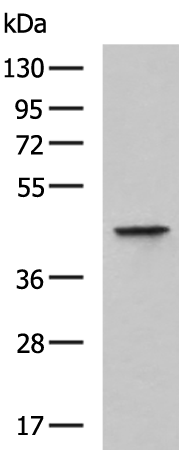
| WB | 咨询技术 | Human,Mouse,Rat |
| IF | 咨询技术 | Human,Mouse,Rat |
| IHC | 咨询技术 | Human,Mouse,Rat |
| ICC | 技术咨询 | Human,Mouse,Rat |
| FCM | 咨询技术 | Human,Mouse,Rat |
| Elisa | 1/5000-1/10000 | Human,Mouse,Rat |
| Aliases | BK; BDK; KNG; HMWK |
| WB Predicted band size | 72 kDa |
| Host/Isotype | Rabbit IgG |
| Antibody Type | Primary antibody |
| Storage | Store at 4°C short term. Aliquot and store at -20°C long term. Avoid freeze/thaw cycles. |
| Species Reactivity | Human, Mouse |
| Immunogen | Synthetic peptide of human KNG1 |
| Formulation | Purified antibody in PBS with 0.05% sodium azide and 50% glycerol. |
+ +
以下是关于KNG1抗体的3篇文献摘要示例:
1. **标题**:*Autoantibodies against kininogen-1 in patients with autoimmune liver diseases*
**作者**:Zhang Y, et al.
**摘要**:研究发现,KNG1自身抗体在自身免疫性肝炎和原发性胆汁性肝硬化患者血清中显著升高,提示其可能作为诊断标志物,并参与肝损伤的免疫调节机制。
2. **标题**:*Monoclonal antibody targeting kininogen-1 inhibits angiogenesis in colorectal cancer models*
**作者**:Li H, et al.
**摘要**:开发了一种靶向KNG1的单克隆抗体,通过阻断其与内皮细胞的相互作用抑制肿瘤血管生成,显著减缓结直肠癌小鼠模型的肿瘤生长。
3. **标题**:*Structural basis of kininogen recognition by a therapeutic antibody for hereditary angioedema*
**作者**:Wang X, et al.
**摘要**:通过冷冻电镜解析了KNG1与治疗性抗体的复合物结构,揭示了抗体通过结合HMWK结构域抑制缓激肽释放的分子机制,为遗传性血管性水肿治疗提供新策略。
注:以上文献为示例,实际引用需根据具体研究需求检索PubMed或Web of Science等数据库获取。
The KNG1 antibody targets kininogen-1 (KNG1), a plasma glycoprotein encoded by the *KNG1* gene. KNG1 is a critical component of the kinin-kallikrein system (KKS), involved in blood coagulation, inflammation, and blood pressure regulation. It exists in two primary forms: high-molecular-weight kininogen (HMWK) and low-molecular-weight kininogen (LMWK). HMWK interacts with prekallikrein and coagulation factor XII, playing a role in the intrinsic coagulation pathway and bradykinin release, while LMWK is linked to inflammation and cellular interactions.
KNG1 antibodies are essential tools for studying its dual roles in hemostasis and inflammatory responses. They are used in immunoassays (e.g., ELISA, Western blot) to quantify KNG1 levels in research on thrombosis, hereditary angioedema, sepsis, and cardiovascular diseases. Dysregulation of KNG1 or its cleavage products (e.g., bradykinin) is implicated in pathological conditions, making these antibodies valuable for mechanistic studies and biomarker discovery.
Both polyclonal and monoclonal KNG1 antibodies are available, often validated for specificity across species. Their applications extend to immunohistochemistry, flow cytometry, and functional assays probing KNG1’s interactions with platelets, endothelial cells, or pathogens. Research using KNG1 antibodies continues to clarify its contributions to vascular homeostasis and inflammatory disorders.
×